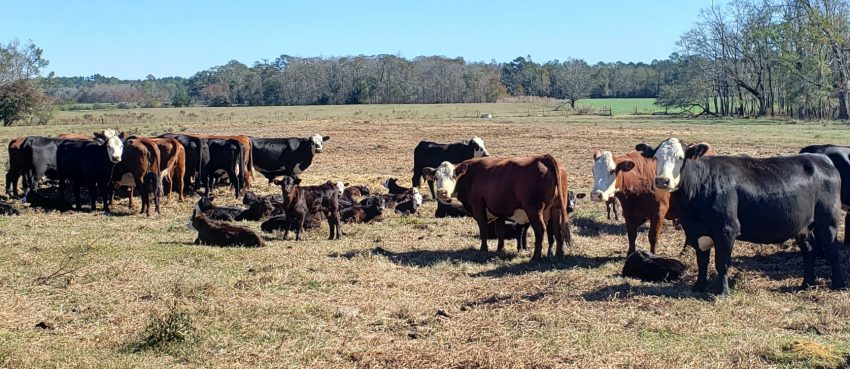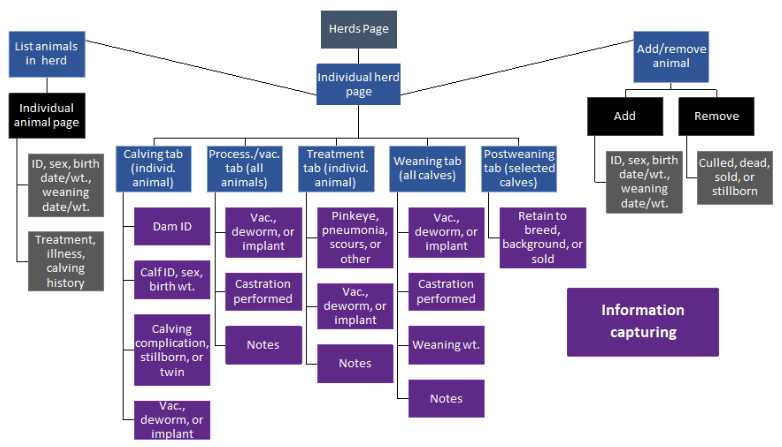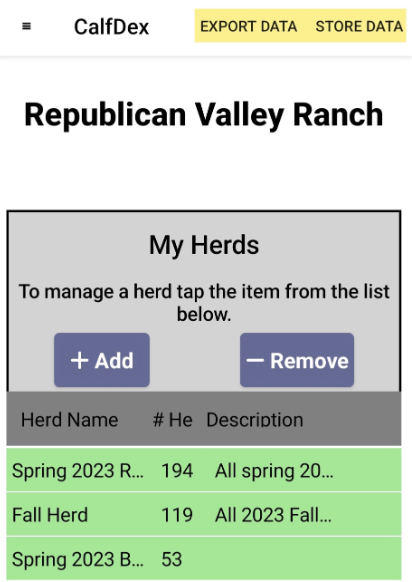
Kansas State University released a basic cow-calf record keeping system app for smart phones called CafDex. Through the app producers can track calving dates, weights, and animal health treatments. Photo Credit: Mark Mauldin, UF/IFAS
Audrey Marchek, Ted Schroeder, Robert Larson, and Jake Hefley, Kansas State University
In December 2022, the framework design for CalfDex, a newly available animal data recording tool, was completed. Developers of CalfDex are now in the process of finalizing features of the application, and seeking users involved in cow-calf production to test the various functions and capabilities of the app. The app is currently available for download on both the Apple App Store and Google Play Store. CalfDex is a free to use mobile application suitable for both iPhone and Android devices. The primary objective of the CalfDex application is to serve as a mobile animal record-keeping platform that provides producers with a modernized option to maintain efficient calving, weaning, and treatment records while dually mitigating the risk of clutter, data loss, and misplacement that is commonly seen with paper records. Privacy is also a top priority to the development team at CalfDex. Each individual account that is created requires a valid email address and unique password, established by the user creating their CalfDex profile. With the capability to track multiple herds and individual animal information, CalfDex is tailored to meet the needs of all sizes of calving operations, from large purebred enterprises, to a 4-H or FFA student beginning their first beef breeding project.
Gathered from previous survey results of producers involved in either cow-calf or feedlot production operations, CalfDex was created according to given information type preferences and feedback indicated by survey respondents. As a recap from the December 2022 publication, survey results from producers in the respective cow-calf and feedlot sectors can be accessed through the following link: Calf Production Data Recording Preferences of Cow-Calf and Feedlot Producers.
Correspondingly, functional tabs within the CalfDex application were designed according to survey results. The app consists of five respective tabs for which users can choose to enter data, including “Calving,” “Processing/vaccination,” “Treatment,” “Weaning,” and “Postweaning.” Figure 1 reveals all possible functions for users to record within the app.
–
Describing the “Information capturing function” in further detail, users also have the capability to save and export any data recorded in CalfDex to a laptop or desktop computer through utilizing the “Store Data” and “Export Data” functions. When a user presses “Store Data,” this action synchronizes and stores data located in the app to ensure all content is present the next time a user logs in. Using the “Export” function both saves and exports all data within the application to the email address that was used to create the designated CalfDex account. Once an “Export” command has been initiated, the producer’s data will be available in the format of an Excel spreadsheet and can be located in the inbox of their primary email address linked to the respective CalfDex account. Figure 3 shows where a user can access the “Store Data” and “Export Data” functions. Users then have the option to edit and share their data with desired parties.
–
The CalfDex development team at Kansas State University is eager to provide prospective users with a modernized animal data management tool to keep pace in an ever-changing industry. Considering the growing importance of information exchange amongst participants in each sector of the beef supply chain, the implementation of an application with the ability to store and upload data at the whole-herd and individual animal level facilitates efficient transfer of information to downstream producers. Moreover, additional opportunities to capture value in marketing at the cow-calf level are presented when greater details on management and pre-conditioning protocols are made available to potential buyers.
–
Links to the Free CalfDex App
Apple Version
Android Version
- Federal Estate Tax and Gift Tax Limits Announced For 2026 - December 19, 2025
- Why Do I Have So Many Open Cows? Causes of Reproductive Failure - December 19, 2025
- Wiregrass Cotton Expo Offers Resources, Research, & Real Solutions for Growers in Southeast – January 22 - December 19, 2025


